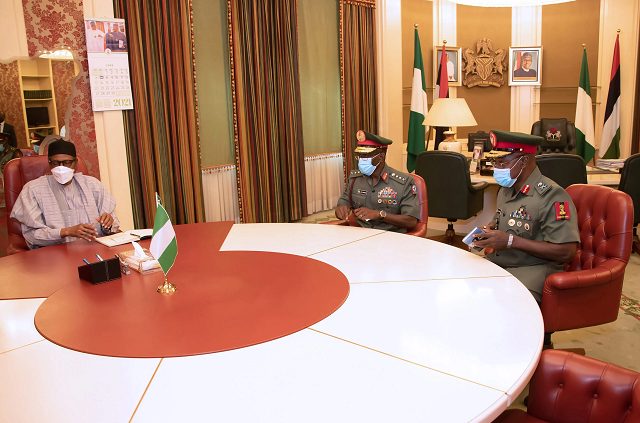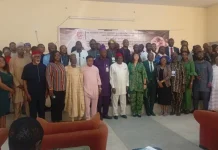President Muhammadu Buhari met with the Chief of Army Staff, Faruk Yahaya, and the Minister of Defence, Bashir Magashi on how to end insecurity in the country on Monday.
Yahaya, who holds the rank of a major-general in the Nigerian Army, was recently appointed as the new army chief, to replace Ibrahim Attahiru following his death in a plane crash just four months after his appointment into office.
Yahaya, who met with the president formally on Monday, was in the company of Bashir Magashi.
Addressing journalists after the meeting, Magashi said the president spoke to Yahaya on improving the nation’s security.
“He told him that there’s a lot of pressure on security and being an actor at one point or the other, has given us a direction in which we can learn from his experiences and apply them to our modern operations, and I think we have taken the advice seriously,” the minister said.
“The issue of synergy among the security forces was also stressed, and I’m sure there will be a lot of changes as regards the security operations in this country.
“The president received us, offered some advice on how we can go about doing this operation and the entire security of the country. We assured him that we will do our best to bring an end to the problem of insecurity in this country.
“He’s very happy. He thanked Mr. President for giving him the opportunity to serve as the chief of army staff and promised that he will bring all his experiences to bear in collaboration with his colleagues to be able to do this country proud.
“The president really has confidence in the new set of people that he has appointed. We wish them the best of luck.”
Asked about what the armed forces is doing to restore peace to the north-west region, Magashi said the military has been rendering a supporting role to the police, which is constitutionally saddled with the responsibility of keeping civil peace.
He said the main concern of the nation’s security agencies is the terror activities in the north-east, particularly that of the Islamic State West African Province (ISWAP).
“In the north-western part of the country, you know that the more concern we have is the insecurity of banditry, kidnapping, and other criminalities,” he said.
“We are taking the challenge, but you know that really, this is the constitutional responsibility of the police. We are only an aid to the police, and we are giving maximum cooperation to the police in order to see an end to this banditry and insecurity in the north-west. Otherwise, I think it’s quite different from the north-east.
“In the north-east, it’s Boko Haram issue and we’re up and doing to ensure that we bring an end to this Boko Haram issue, especially with this development of ISWAP.”













